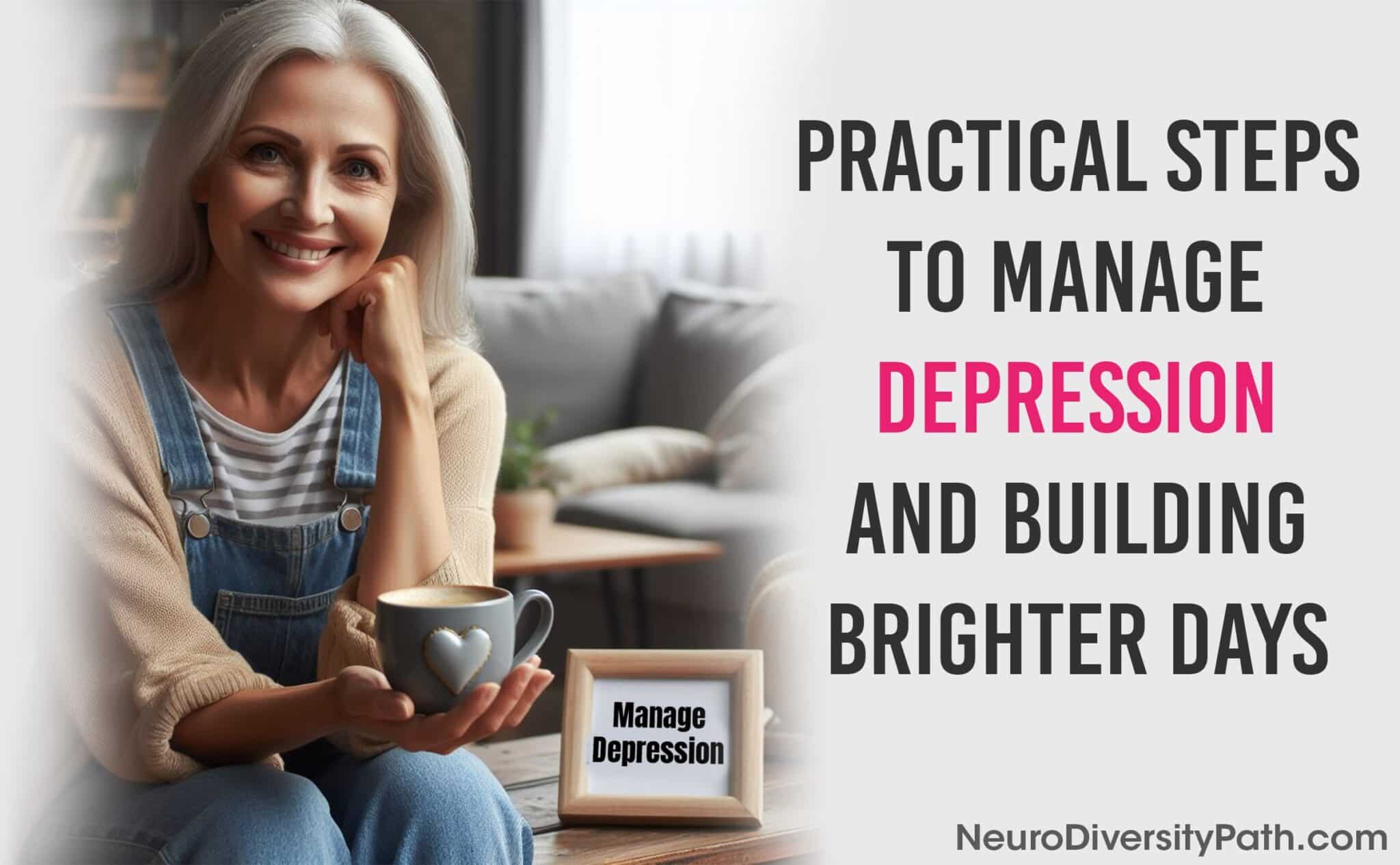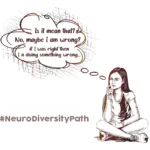Are you tired of feeling like depression has the upper hand in your life? What if I told you there are practical steps you can take to regain control and build brighter days ahead? In this post, we’ll delve into seven actionable strategies to manage depression and cultivate a brighter outlook on life. Get ready to discover practical tools, gain valuable insights, and embark on a more fulfilling and joyful journey. Join us on NeuroDiversity Path as we equip you with the knowledge and resources you need to navigate the challenges of depression and embrace the possibility of brighter days ahead.

Understanding Depression: Illuminating the Path
Shedding Light on Depression
Understanding depression is the first step toward reclaiming control over your mental health. Illuminating the path involves recognizing that depression is not simply feeling sad or down but a complex and multifaceted mental health condition. It can manifest in various ways, including persistent feelings of sadness, loss of interest in activities, changes in appetite or sleep patterns, and difficulty concentrating. Acknowledging the symptoms and their impact is essential in seeking appropriate support and treatment. Depression is not a sign of weakness or personal failure; it is a legitimate medical condition that affects millions of people worldwide. By shining a light on depression, we can reduce stigma, increase awareness, and pave the way for healing and recovery.
Seeking Understanding
Seeking understanding involves educating ourselves about the causes, symptoms, and treatment options for depression. Knowledge is power, and by learning more about depression, we can empower ourselves to make informed decisions about our mental health. This may involve reading reputable sources, seeking guidance from mental health professionals, or joining support groups to connect with others with similar experiences. Understanding that depression is treatable can provide hope and encouragement. By taking proactive steps to educate ourselves and others, we can diminish the stigma surrounding depression and create a more supportive and compassionate society.
Assessing Your Resources
Recognizing Your Strengths
Assessing your resources begins with recognizing the strengths and assets you already possess. Take a moment to reflect on your personal qualities, skills, and support systems. What strengths have helped you navigate challenges in the past? Who are the people in your life you can turn to for support and encouragement? Recognizing these resources is the first step toward managing depression. It can provide a sense of empowerment as you embark on your journey toward well-being.
Identifying Areas of Need
Once you’ve identified your strengths, you must recognize areas where you may need additional support or resources. This could include professional help from a therapist or counselor, educational resources to learn more about depression and coping strategies, or practical assistance with daily tasks if you’re feeling overwhelmed. Identifying areas of need allows you to prioritize where to focus your efforts and seek the appropriate resources to address them.
Cultivating Positive Thinking
Understanding the Power of Positive Thinking
Cultivating positive thinking involves harnessing the transformative power of your thoughts. Understanding that your thoughts impact your emotions and behaviors is key. By fostering a positive mindset, you can shift your perspective on challenges, viewing them as opportunities for growth. Positive thinking doesn’t mean denying difficult emotions; it’s about focusing on the aspects you can control and finding silver linings even in difficult situations.
Practicing Gratitude and Mindfulness
Practicing gratitude and mindfulness are powerful tools for cultivating positive thinking. Gratitude shifts your focus from what’s lacking to what you already have, fostering a sense of abundance. Mindfulness helps you stay present, allowing you to observe your thoughts without judgment and choose more positive interpretations. By incorporating these practices into your daily life, you can train your brain to adopt a positive outlook, even in tough times.
Nurturing Connections
The Importance of Social Connections
Nurturing connections with others is essential for mental well-being. Social support provides a buffer against stress and can significantly impact your ability to cope with depression. Research has shown that individuals with strong social networks tend to have lower levels of depression and higher overall life satisfaction (Cacioppo & Patrick, 2008). Prioritizing time with loved ones and seeking out opportunities for social interaction can provide emotional support and a sense of belonging.
Building and Maintaining Relationships
Building and maintaining relationships requires effort and commitment. Communication is key—expressing your thoughts and listening with empathy fosters deeper connections. Showing appreciation for loved ones and being there for them when needed strengthens bonds. Quality matters more than quantity; even a few close relationships can significantly impact your mental well-being.
Engaging in Physical Activity
The Mental Health Benefits of Exercise
Engaging in physical activity plays a significant role in managing depression. Research has shown that regular exercise can have profound effects on mental well-being. A study published in the Journal of Psychiatric Research found that individuals who engaged in moderate-intensity exercise experienced a significant reduction in depressive symptoms (Schuch et al., 2018). Recognizing the mental health benefits of exercise involves prioritizing physical activity as part of your self-care routine.
The Role of Exercise in Stress Reduction
Exercise reduces stress levels, which can exacerbate depression symptoms. Physical activity triggers the release of endorphins, chemicals in the brain that elevate mood. Incorporating regular exercise into your routine can help alleviate stress and promote a sense of calm.
Establishing an Exercise Routine
Establishing an exercise routine involves setting realistic goals and creating a plan that works for you. Start small, gradually increasing intensity as you build strength. Finding activities you enjoy is key to maintaining consistency.
Prioritizing Self-Care
Understanding Self-Care
Prioritizing self-care is essential for managing depression. Self-care involves attending to your physical, emotional, and mental needs. It’s about recognizing that taking care of yourself is not selfish, but necessary for coping with life’s challenges.
Embracing Self-Care Practices
Embracing self-care means making time for activities that replenish your energy. Whether it’s spending time in nature, engaging in hobbies, or practicing mindfulness, prioritizing self-care helps you build resilience.
Setting Goals and Taking Action
Setting Goals
Setting goals and taking action are pivotal in overcoming depression. Research from the University of Toronto has shown that setting specific, achievable goals can significantly improve mood and motivation. Clear goals provide direction and purpose, helping break the cycle of negativity often associated with depression.
Identifying Areas for Growth
Identify areas where you want improvement, whether in relationships, career, or personal growth. Reflecting on your goals allows you to focus your efforts effectively.
Taking Action
Once your goals are clear, it’s time to take action. Break down your goals into manageable steps and create a plan to achieve them. Consistent steps build momentum and boost confidence. Stay flexible but remain committed to your goals. With determination, you can overcome obstacles and realize your aspirations.
“In the midst of winter, I found there was, within me, an invincible summer.” – Albert Camus
In conclusion, these seven practical steps offer a comprehensive guide to managing depression and fostering a brighter outlook. By understanding depression, assessing personal resources, cultivating positive thinking, nurturing connections, engaging in physical activity, prioritizing self-care, and setting goals, you can navigate the challenges of depression and embrace brighter days ahead. Let’s continue supporting each other on our journeys toward resilience and recovery.
Share your thoughts on this article in the comments below. What strategies have helped you manage depression? Your insights may inspire others on their paths to healing.





